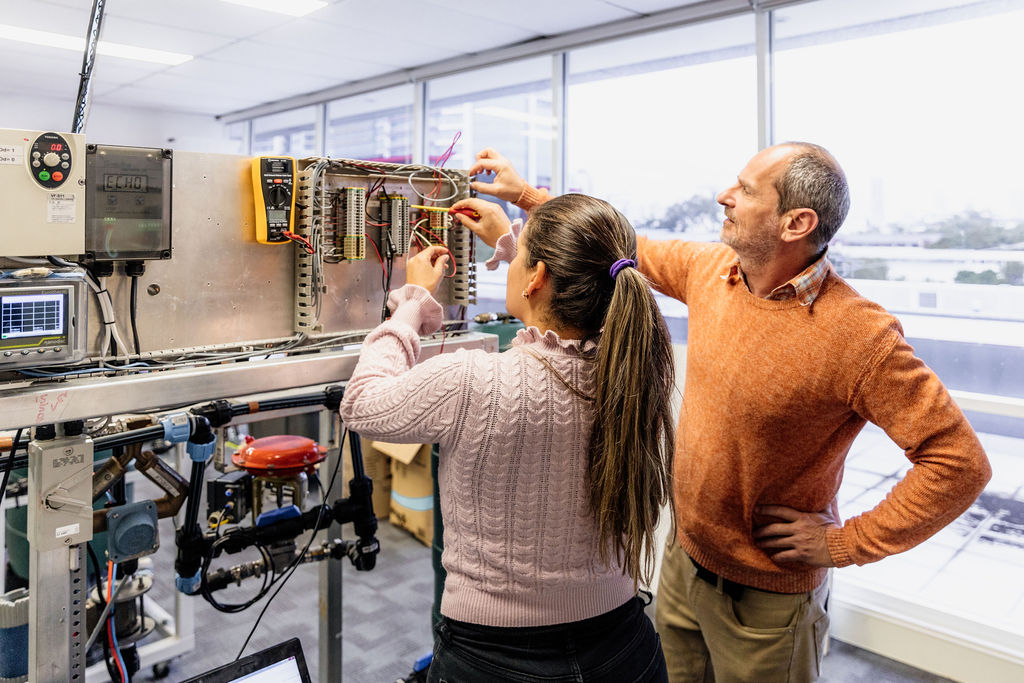Electrotechnology and electrician careers can be highly rewarding, but the interview process can be challenging. To make a great impression on potential employers, it’s crucial to prepare for the interview, learn electrotechnology and common electrician interview questions, and know what to bring with you. Here’s a guide on how to prepare for an electrotechnology or electrician interview in Australia.
What to bring to an interview in electrotechnology or for an electrician position
Research the company or organisation
Look up the company’s website, mission statement, and values. Familiarise yourself with their projects, clients, and any unique services they offer. Understand their primary focus, such as residential, commercial, or industrial electrical work.
Review your qualifications and experience
Ensure you have a clear understanding of your qualifications and experience, and how they align with the position and the needs of the company. Do you have a current electrical license? Is your qualification in electrotechnology relevant to the role?
Read the job description and requirements thoroughly. Be prepared to discuss how you meet the specific skills or qualifications required for the position.
Prepare answers to common interview questions
Practice answering common interview questions for electrotechnology or electrician roles, and personalise them to your own experiences. Provide specific examples of your qualifications, projects you’ve worked on, and how you’ve addressed challenges in your field. Think about how you can demonstrate your ability to solve complex problems, maintain safety standards, and stay up-to-date with industry advancements.
Understand the regulations and legislation
Be familiar with the regulatory and legislative requirements for working in the electrotechnology industry in Australia, such as the Electrical Safety Act and relevant Australian Standards. Demonstrating knowledge of these requirements will show your commitment to the field and your dedication to maintaining high professional standards.
Prepare any materials you may need
Some employers may request a portfolio of your work or specific examples of projects you’ve completed. Ensure you have any necessary materials ready for the interview, but be careful not to share confidential information from previous employers or clients.
Dress professionally
Make a strong first impression by dressing professionally for your interview. While the attire may be more relaxed for a hands-on role, it’s still important to look presentable and show respect for the interview process.
Be prepared to ask questions
Have some questions ready to ask your interviewers about the company, the role, and their expectations. This demonstrates your interest and enthusiasm for the job and helps ensure that the position aligns with your career goals.
Common electrician interview questions you could be asked
Tell us about your experience as an electrician
Provide a brief overview of your work experience, focusing on roles and projects relevant to the position you’re applying for. Highlight any specialised skills, such as working with specific equipment or systems, and emphasise your ability to work independently or as part of a team.
What made you decide to become an electrician?
Share your motivation for pursuing a career in electrotechnology. This could include your passion for problem-solving, an interest in electrical systems, or a desire to contribute to a safer and more efficient world.
How do you ensure safety on the job site?
Emphasise your commitment to safety and adherence to safety regulations. Discuss how you perform risk assessments, use personal protective equipment (PPE), and follow safety procedures, such as lockout/tagout protocols. Mention any safety training you’ve completed.
How do you stay up-to-date with industry advancements and new technologies?
Explain your approach to continuous learning and professional development. This could include attending workshops, conferences, or trade shows, subscribing to industry publications, or participating in online forums and communities. Highlight any certifications or specialised training you have completed.
Can you describe a challenging project or situation you've encountered and how you resolved it?
Provide a specific example of a difficult project or problem you’ve faced in your career. Describe the steps you took to address the issue, the skills you utilised, and the outcome. Emphasise your ability to troubleshoot, think critically, and adapt to new situations.
How do you handle working under pressure or meeting tight deadlines?
Explain your strategies for managing stress and prioritising tasks, such as creating a schedule, breaking tasks into smaller components, and maintaining open communication with your team or supervisor. Mention any relevant experiences where you successfully met a tight deadline or managed a high-pressure situation.
Have you ever had a conflict with a colleague or supervisor? How did you resolve it?
Choose an example that demonstrates your ability to handle conflicts professionally and collaboratively. Describe the situation, your role in resolving the conflict, and any lessons learned. Emphasise your communication skills, willingness to listen, and ability to find mutually beneficial solutions.
Are you familiar with the Australian Standards and Electrical Safety regulations?
Demonstrate your knowledge of the relevant Australian Standards, Electrical Safety Act, and other regulations that apply to the electrical industry. Explain how you’ve applied these standards and regulations in your past work to ensure compliance and maintain a safe work environment.
Questions you can ask during your interview
What type of projects does the company typically work on? Are there any upcoming projects that the person in this role would be involved in?
Asking this question helps you understand the company’s areas of expertise and the types of tasks you’ll be working on. This allows you to assess whether the role aligns with your skills and interests.
What are the company's main priorities or focus areas in the electrotechnology or electrical field?
This question shows that you’re interested in the company’s goals and strategic direction. It also helps you determine if the company’s priorities align with your own values and career objectives.
How does the company support professional development for its employees? Are there opportunities for additional training or certifications?
By asking about professional development, you demonstrate your commitment to continuous learning and self-improvement. It also helps you understand what growth opportunities are available within the company.
What is the typical career path for someone in this position? How does the company support employee growth and advancement?
This question shows that you’re looking for long-term growth within the company. It also helps you understand the potential career trajectory and whether the organisation supports employee advancement.
Can you describe the company culture and working environment? What do you enjoy most about working here?
Understanding the company culture is essential to determining whether you’ll be a good fit. This question also allows you to connect with the interviewer on a personal level, which can help build rapport.
How does the company prioritise safety and compliance with industry regulations? Are there any specific safety policies or protocols in place?
This question highlights your commitment to safety and regulatory compliance. It also helps you understand the company’s approach to these important aspects of the electrical industry.
What are the expectations for the first few months in this role? Are there any key milestones or goals that I would be expected to achieve?
Asking about expectations demonstrates your eagerness to succeed and helps you understand the company’s priorities for the role. It also allows you to gauge whether the expectations are realistic and attainable.
How does the company stay up-to-date with industry advancements and new technologies? Are employees encouraged to explore innovative solutions?
This question shows that you’re forward-thinking and interested in staying current within the industry. It also helps you learn about the company’s approach to innovation and technology adoption.
Can you provide some insight into the team structure and how the person in this role would collaborate with others?
Understanding the team structure and dynamics helps you determine if the work environment suits your preferred working style. It also demonstrates your interest in being an effective team member.
What are the next steps in the interview process? When can I expect to hear back about the outcome of my application?
This question helps you understand the company’s hiring timeline and what to expect moving forward. It also demonstrates your enthusiasm for the role and interest in progressing in the interview process.
Practising for an electrician interview or a position in electrotechnology
Practising for an electrician interview can help you feel more prepared and confident on the day of the interview. You can prepare your responses to common interview questions and invite a friend or family member to roleplay with you to practice. Seek out additional electrotechnology resources, industry updates, and company information to enhance your knowledge and understanding.
And remember, the most important thing is to be yourself, speak with confidence, and show your enthusiasm for the role and the company. If you’re excited about the opportunity, be honest, and give it your best!




